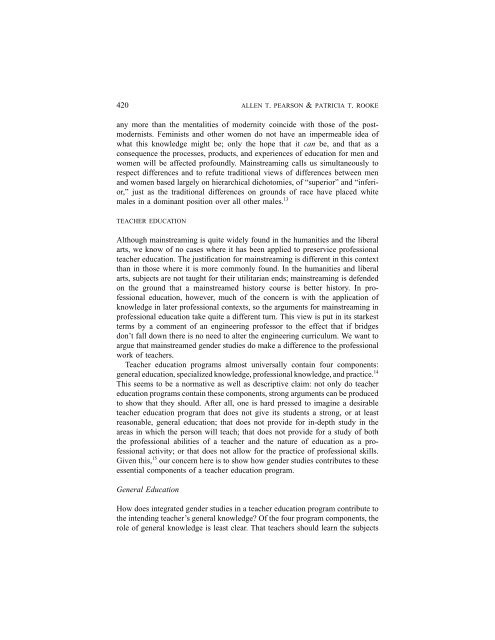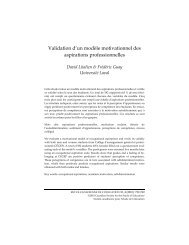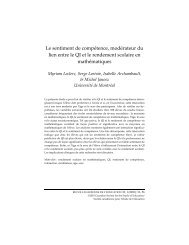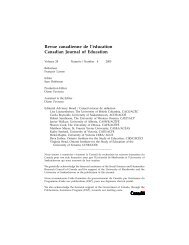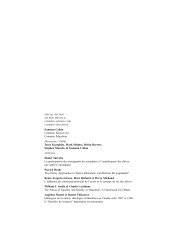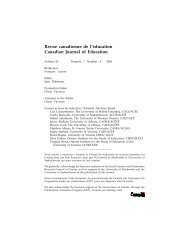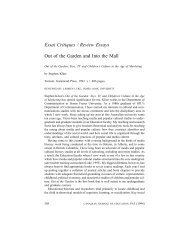Mireille Falardeau et Michel Loranger Le choix de stratégies ... - CSSE
Mireille Falardeau et Michel Loranger Le choix de stratégies ... - CSSE
Mireille Falardeau et Michel Loranger Le choix de stratégies ... - CSSE
You also want an ePaper? Increase the reach of your titles
YUMPU automatically turns print PDFs into web optimized ePapers that Google loves.
420 ALLEN T. PEARSON & PATRICIA T. ROOKE<br />
any more than the mentalities of mo<strong>de</strong>rnity coinci<strong>de</strong> with those of the postmo<strong>de</strong>rnists.<br />
Feminists and other women do not have an impermeable i<strong>de</strong>a of<br />
what this knowledge might be; only the hope that it can be, and that as a<br />
consequence the processes, products, and experiences of education for men and<br />
women will be affected profoundly. Mainstreaming calls us simultaneously to<br />
respect differences and to refute traditional views of differences b<strong>et</strong>ween men<br />
and women based largely on hierarchical dichotomies, of “superior” and “inferior,”<br />
just as the traditional differences on grounds of race have placed white<br />
males in a dominant position over all other males. 13<br />
TEACHER EDUCATION<br />
Although mainstreaming is quite wi<strong>de</strong>ly found in the humanities and the liberal<br />
arts, we know of no cases where it has been applied to preservice professional<br />
teacher education. The justification for mainstreaming is different in this context<br />
than in those where it is more commonly found. In the humanities and liberal<br />
arts, subjects are not taught for their utilitarian ends; mainstreaming is <strong>de</strong>fen<strong>de</strong>d<br />
on the ground that a mainstreamed history course is b<strong>et</strong>ter history. In professional<br />
education, however, much of the concern is with the application of<br />
knowledge in later professional contexts, so the arguments for mainstreaming in<br />
professional education take quite a different turn. This view is put in its starkest<br />
terms by a comment of an engineering professor to the effect that if bridges<br />
don’t fall down there is no need to alter the engineering curriculum. We want to<br />
argue that mainstreamed gen<strong>de</strong>r studies do make a difference to the professional<br />
work of teachers.<br />
Teacher education programs almost universally contain four components:<br />
general education, specialized knowledge, professional knowledge, and practice. 14<br />
This seems to be a normative as well as <strong>de</strong>scriptive claim: not only do teacher<br />
education programs contain these components, strong arguments can be produced<br />
to show that they should. After all, one is hard pressed to imagine a <strong>de</strong>sirable<br />
teacher education program that does not give its stu<strong>de</strong>nts a strong, or at least<br />
reasonable, general education; that does not provi<strong>de</strong> for in-<strong>de</strong>pth study in the<br />
areas in which the person will teach; that does not provi<strong>de</strong> for a study of both<br />
the professional abilities of a teacher and the nature of education as a professional<br />
activity; or that does not allow for the practice of professional skills.<br />
Given this, 15 our concern here is to show how gen<strong>de</strong>r studies contributes to these<br />
essential components of a teacher education program.<br />
General Education<br />
How does integrated gen<strong>de</strong>r studies in a teacher education program contribute to<br />
the intending teacher’s general knowledge? Of the four program components, the<br />
role of general knowledge is least clear. That teachers should learn the subjects


